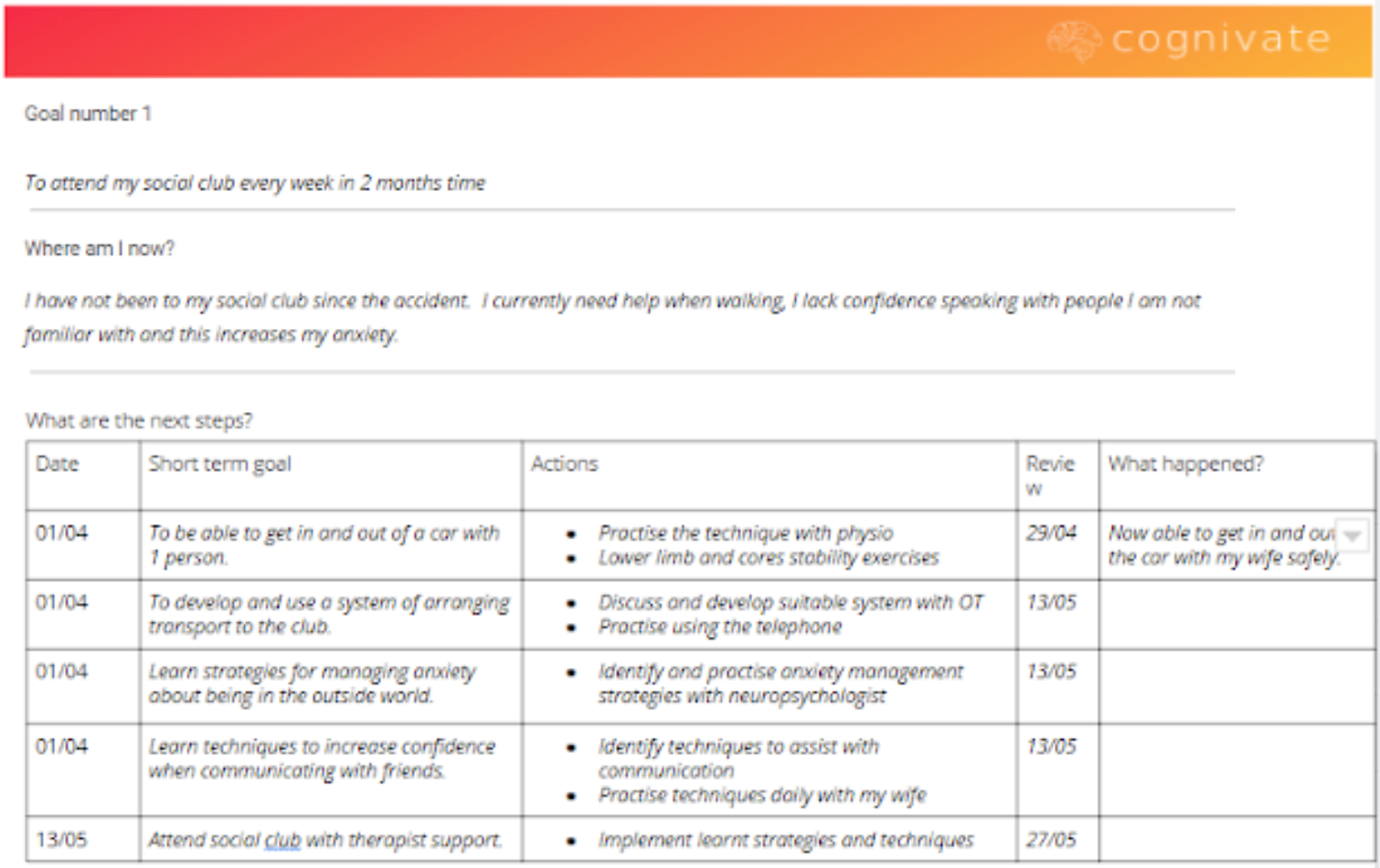Goal setting is a vital part of the rehabilitation process, because it is when you and those around you, together with your therapists, agree on what you want to achieve and how everyone can work together to help you do so.
*** Your goals should be personally important to you, so that when you achieve them your quality of life will be better ***
How should I go about deciding what my goals are?
You and your family may already have fairly clear ideas about what you would like to get from your rehabilitation programme, but don’t worry if you aren’t sure yet – we’re here to help you. Our therapists are keen to understand what is most important to you, and we look forward to meeting you to hear about your ambitions and priorities.
When you’re thinking about what you would like to achieve, ask yourself some of these questions:
- What is most important to you in terms of your recovery?
- What have you already achieved?
- Have you run into any barriers which have got in the way of your progress?
- What motivates you in general – e.g. what do you like doing, where do you like spending time, who do you like spending time with?
- Are there any specific things you would like to be able to do again?
- Are there particular problems which make you feel frustrated or fed up?
- What improvements in your abilities or activities would make life better for you and your family?
How will the therapy team help me to set my goals?
The benefit of working with an interdisciplinary team like Cognivate is that the therapists are knowledgeable and creative in helping you to work out what your most important goals are and then to achieve them.
When we do this, it’s really important that we help you describe your goals clearly so that everyone involved – you, your family, the therapists – has a shared understanding. This means that the goal will be worded so that it explains exactly what you want to be doing, how often, and with what kind of support (if any).
We will also put a realistic timeframe around each goal, as this helps to motivate everyone by ensuring that we review your progress with you at regular intervals. This means that we’re able to identify and troubleshoot any problems, make adjustments to your goal if appropriate, and help you to build on successful goal achievement by setting new ones.
This is sometimes described as SMART goal-setting, with each letter in the word SMART standing for an important feature of the approach:
|
S |
M |
A |
R |
T |
|
SPECIFIC |
MEASURABLE |
ACHIEVABLE |
RELEVANT |
TIMED |
|
The activity or outcome is specific – that is, clearly defined |
It’s described in ways which mean that we can measure your progress and it’s clear when you’ve achieved it and |
It’s realistic – better to aim for something good which is possible than something amazing but impossible! |
It’s relevant (important) to you and to your overall quality of life |
We’ll set a realistic timeframe for you to achieve it so you can see the progress you’re making |
How to create an action plan
You will work towards your overall long-term goals via a series of stepping stones, which we refer to as short-term goals. These take the form of specific activities and achievements along the way, and all of them will be defined in a ‘smart’ way.
Each short-term goal will have an action plan which sets out what you and all those around you (e.g. your therapists, your family, friends, colleagues) will do to help you achieve it.
AN EXAMPLE
John has had problems with his memory and his mobility since he sustained a brain injury two years ago, and he has lost confidence in his ability to mix with people other than his family. Before the accident he was sociable and saw a lot of friends at a local social club, but because of his problems he now spends most of his time at home and is lonely and bored. He is now highly motivated to start spending time at the club again, though as it is some distance away he will need to take a taxi and at the moment he has difficulty in getting in and out of cars.
His therapists feel that he should be able to manage this, and help him to identify key challenges/problems relating to his mobility, his anxiety, and his memory. Each of these is set out as a short-term goal, as shown below.
John’s long-term goal:
- To attend my social club every week.
His short-term goals:
- to learn and use strategies for managing my anxiety about being in the outside world
- to learn and use techniques which increase my confidence in communicating with my friends
- to be able to get in and out of a car with help from just one other person
- to develop and use a system for organising transport
- to attend the social club with support from a therapist
His goals and the associated action plans are recorded on a sheet which he, his wife and the therapists can all see. The therapists believe that these can be accomplished within about two months, and for each action plan they agree a target date at which they will together review his progress. This is what the sheet looks like:

Linking things together
There are lots of connections between someone’s varied goals and action plans, and in the ways that therapists work together to help you achieve your goals. For example:
- some action plans may help you achieve more than one goal: e.g. an action plan which helps you to manage your fatigue may enable you to improve your mobility, to feel less stressed, and to participate more in social activities.
- therapists may overlap in what they do with you: e.g. if you have problems with balance and also with communication, the speech therapist will tell the physiotherapist how to help you with your communication and the physiotherapist will tell the speech therapist how to help you with your balance. That means that both of them can make sure they help you put all of the relevant skills into practice during their own sessions with you.
- therapists may do joint sessions with you in order to bring their expertise together. So, for instance, the physiotherapist and the psychologist might see you at the same time so that they can work out how to help you manage your anxiety while you are practising your walking.
Progress reviews
It’s really important that you and the team review your progress at regular intervals, to ensure that your rehabilitation is on the right track and going well.
- Sometimes you will make faster progress than anyone expected, and a review will allow us to help you set new goals.
- Sometimes progress will have been slower, and a review will help us work out why so that we can find a solution.
Success?
If you’ve achieved a goal, consider whether you want to focus on maintaining your progress or whether you would like to go further. Maintaining the progress you’ve made isn’t always easy and may take a lot of effort (like when someone loses weight but finds it hard to keep it off!). It’s important to consider with your therapists and other people involved in your life what you need to do and whether you need any ongoing help.
If you decide to try and go further, the process of setting new goals and action plans starts again, in just the same structured way.
If you didn’t achieve a goal?
We will help you consider why. Was the goal realistic? Has something else been a higher priority? Were there unexpected difficulties or barriers?
In each case we will consider options with you, including whether goals should be changed or whether we can find ways around the barriers.
How and when is progress reviewed?
Some people prefer a formal meeting to discuss their goals and their progress with everyone who is involved, whereas others prefer a more informal approach.
We will discuss with you and your family when it would be helpful to have a review, and what approach you would prefer.

